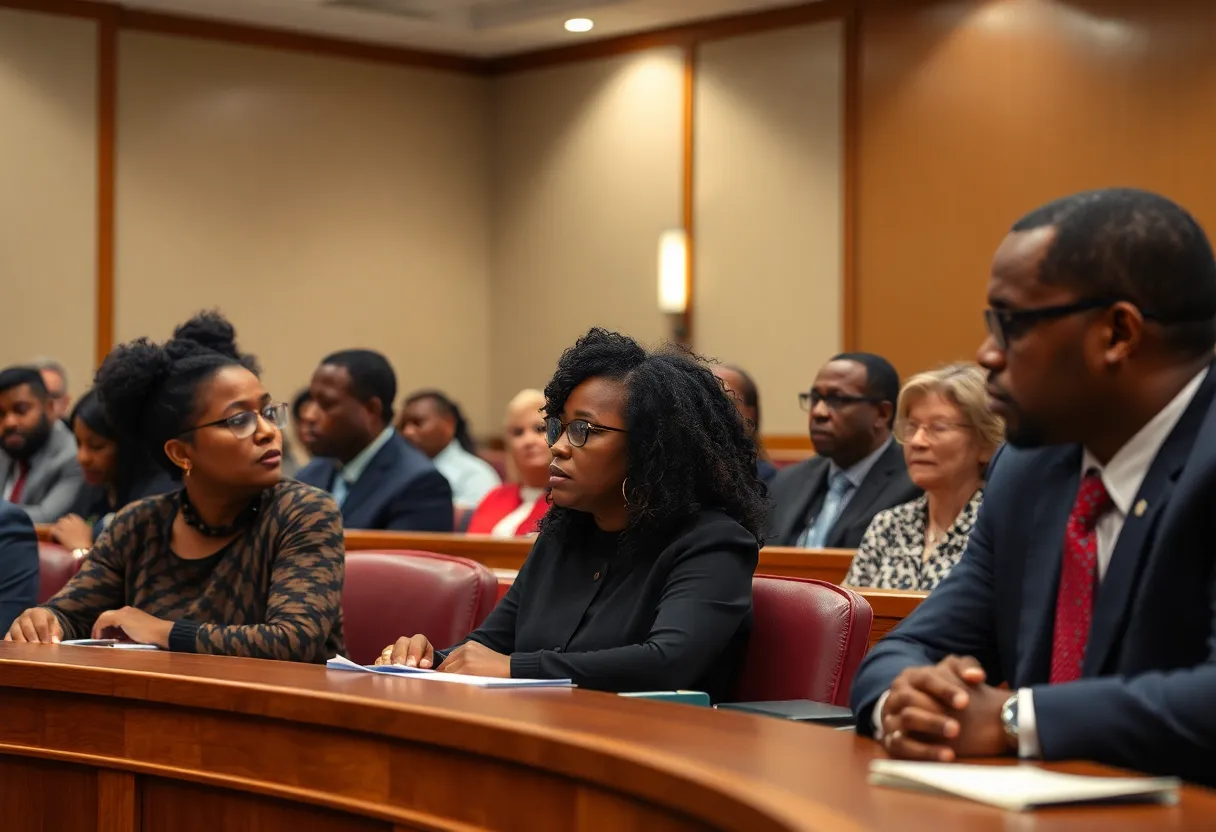News Summary
Trina Hewell, an East Nashville community member, stood before the Metro Council on February 18, 2025, to voice her opposition to the controversial Fusus surveillance bill. She raised concerns about state and federal influences on local governance, highlighting the need for legal understanding among council members. As discussions on community input and safety measures unfolded, attendees were left questioning the implications of surveillance on privacy rights and community engagement.
East Nashville Resident Takes on Metro Council Over Surveillance Legislation
On February 18, 2025, an East Nashville community member named Trina Hewell stepped up to address an urgent matter before the Metro Council. In a passionate stand against the so-called “Fusus guardrails” bill, Hewell raised some crucial questions about how federal and state policies might intrude upon local laws and practices.
Hewell was not shy about drawing an eye-catching parallel between governmental levels, likening state and federal entities to “tractor trailers” that ignore the established municipal “guardrails.” This colorful analogy underscored her concern that larger policies have the potential to drive straight over local governance.
Questioning Legal Understanding
With a keen eye for the current legal landscape, Hewell criticized the council members for what she perceives as a lack of awareness regarding the real implications of surveillance measures. Out of a total of 40 council members, only seven hold law degrees, which Hewell believes signals a significant disconnect between the lofty ideals of law and their day-to-day impacts on the community. This divide could prove detrimental, especially when it comes to sensitive topics like surveillance.
One issue that caught public attention during the meeting was the Metro Council’s recent habit of debating bills long before they hit the committee floor. A particular point of contention emerged during a lengthy 45-minute discussion about the moving of Metro’s Historical Commission and Historic Zoning Commission into the umbrella of the Planning Department.
The Role of Community Input
Councilmember Emily Benedict, one of the prime sponsors of this proposal, proposed to let the process unfold naturally and emphasized her commitment to fostering more conversations surrounding the bill. However, Councilmember Brenda Gadd expressed concerns over community engagement, contrasting the substantial discussions on the historical commission with the almost absent input requested for the Fusus bill. This comparison sparked debate around the council’s methods for integrating community voices into legislative processes.
A Sudden Meeting Adjournment
That evening, as weather conditions worsened, the Metro Council decided to adjourn the meeting early. This decision was made despite claims from Mayor O’Connell’s office about the urgency of discussing the Fusus bill, leaving many community members pondering about the future of privacy and surveillance in Nashville.
The Implications of the Fusus Bill
The Fusus bill is particularly significant as it aims to implement advanced video surveillance technologies within the community. This initiative raises essential questions about privacy rights and the potential misuse of surveillance tools by authorities. The controversy surrounding the bill indicates a growing unease among residents who are concerned about the intersections of safety and individual freedoms.
School Safety Measures Spark Another Debate
In another pressing matter, the council also passed a resolution aimed at evaluating safety plans for Metro Nashville Public Schools after a tragic school shooting incident. This resolution received a mixed response, passing with a 27-8 vote but causing a divide among council members regarding the effectiveness of current school safety measures.
Looking Ahead: Funding Proposals and Community Safety
The discussions during the meeting also touched on various funding proposals leading up to the upcoming 2026 budget. Public comments reflected a strong desire for enhanced community safety and comprehensive service programs, further highlighting the need for community involvement in shaping legislative outcomes.
As East Nashville residents continue to grapple with pressing issues like surveillance and public safety, the Metro Council’s decision-making processes will remain a focal point. Community engagement, legislative scrutiny, and constant dialogue will be essential as Nashville navigates these contemporary challenges.
Deeper Dive: News & Info About This Topic
HERE Resources
Eaton Fire Investigation Links Electrical Failures to Tragedy
Additional Resources
- Nashville Banner: Metro Council Meeting Agenda
- Axios: Metro Nashville Vote on Police Video Technology
- Tennessean: Investigation into Antioch High School Shooting
- News Channel 5: Metro Nashville Council’s Rejection of Settlement
- Encyclopedia Britannica: Surveillance Legislation

Author: HERE Nashville
The NASHVILLE STAFF WRITER represents the experienced team at HERENashville.com, your go-to source for actionable local news and information in Nashville, Davidson County, and beyond. Specializing in "news you can use," we cover essential topics like product reviews for personal and business needs, local business directories, politics, real estate trends, neighborhood insights, and state news affecting the area—with deep expertise drawn from years of dedicated reporting and strong community input, including local press releases and business updates. We deliver top reporting on high-value events such as CMA Fest, Bonnaroo Music & Arts Festival, and Nashville Pride Festival. Our coverage extends to key organizations like the Nashville Area Chamber of Commerce and Nashville Health Care Council, plus leading businesses in healthcare, automotive, and technology that power the local economy such as HCA Healthcare, Bridgestone Americas, and Asurion. As part of the broader HERE network, including HEREBristol.com, HEREChattanooga.com, HEREKnoxville.com, and HEREMemphis.com, we provide comprehensive, credible insights into Tennessee's dynamic landscape.



